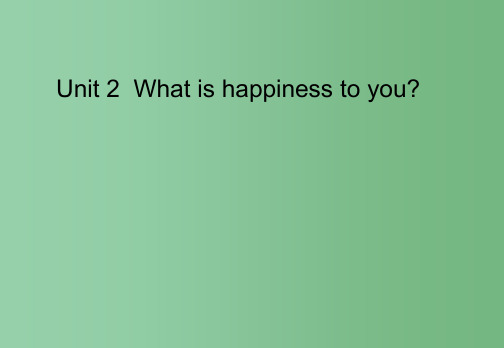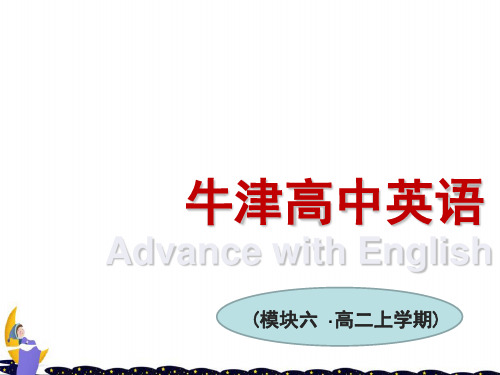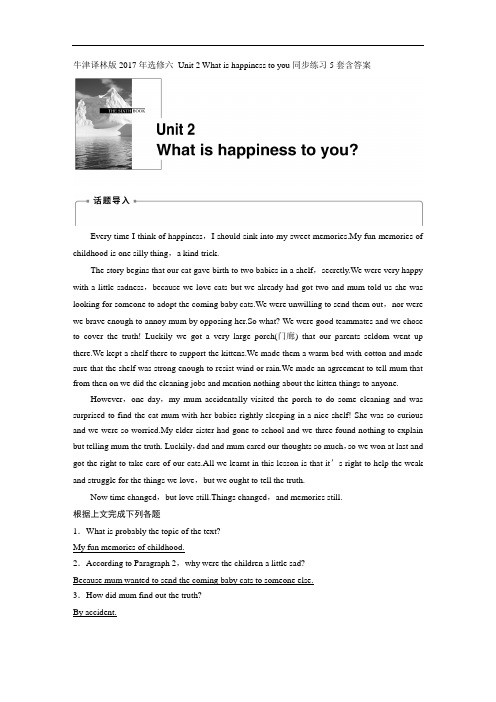2017届译林版选修六Unit 2 What is happiness to you单元测试卷
- 格式:docx
- 大小:30.37 KB
- 文档页数:10






牛津译林版2017年选修六Unit 2 What is happiness to you同步练习5套含答案Every time I think of happiness,I should sink into my sweet memories.My fun memories of childhood is one silly thing,a kind trick.The story begins that our cat gave birth to two babies in a shelf,secretly.We were very happy with a little sadness,because we love cats but we already had got two and mum told us she was looking for someone to adopt the coming baby cats.We were unwilling to send them out,nor were we brave enough to annoy mum by opposing her.So what? We were good teammates and we chose to cover the truth! Luckily we got a very large porch(门廊) that our parents seldom went up there.We kept a shelf there to support the kittens.We made them a warm bed with cotton and made sure that the shelf was strong enough to resist wind or rain.We made an agreement to tell mum that from then on we did the cleaning jobs and mention nothing about the kitten things to anyone.However,one day,my mum accidentally visited the porch to do some cleaning and was surprised to find the cat mum with her babies rightly sleeping in a nice shelf! She was so curious and we were so worried.My elder sister had gone to school and we three found nothing to explain but telling mum the truth. Luckily,dad and mum cared our thoughts so much,so we won at last and got the right to take care of our cats.All we learnt in this lesson is that it’s right to help the weak and struggle for the things we love,but we ought to tell the truth.Now time changed,but love still.Things changed,and memories still.根据上文完成下列各题1.What is probably the topic of the text?My fun memories of childhood.2.According to Paragraph 2,why were the children a little sad?Because mum wanted to send the coming baby cats to someone else.3.How did mum find out the truth?By accident.Period One Welcome to the unit & ReadingⅠ.重点单词1.surround v t.围绕,环绕;n.环绕物surrounding adj.四周的;环绕的surroundings n.环境;周围的事物2.suffering n.疼痛,痛苦;折磨suffer v.遭受;受苦;忍受;变糟3.viewer n.电视观众;观看者view n.景色;视野;看法4.junior adj.青少年的;地位(或职位、级别)低下的5.specialist n.专科医师;专家special adj.专门的;特别的6.severe adj.严重的;严厉的,严格的;艰巨的7.appreciation n.感激,感谢;欣赏;理解;(艺术方面的)鉴定,评估appreciate v t.感激;欣赏8.sorrow n.悲伤,悲痛9.accomplish v t.完成,实现10.thankful adj.感激的,感谢的11.adapt v i.&v t.(使)适应;改编12.advocate v t.拥护;支持;提倡13.admirable adj.令人钦佩的,令人羡慕的,值得赞美的admire v t.钦佩;仰慕14.unbearable adj.无法忍受的bearable adj.可忍受的bear v t.承受;忍受;承担15.temporary adj.暂时的;短暂的16.depth n.深度;深厚;最深处deep adj.深的deeply ad v.深深地Ⅱ.重点短语1.be surrounded by被……所包围2.meet/reach a goal 实现目标3.expect sb.to do sth.指望/期待/预期某人做某事4.apart from远离,和……不在一起;除了5. cheer sb.up 使……高兴/振奋起来6.in good spirits 心情好7.be proud of以……为荣8.adapt to适应9.be inspired by受到……的激励10.go after追求;谋求Ⅲ.重点句式1.in case引导状语从句Well, in case some of our viewers don’t know her story,can you tell us a little bit about Sang Lan and who she is?嗯,或许有些观众还不知道桑兰的故事,您能给我们简单介绍一下桑兰吗?2.by the time引导时间状语从句By the time she competed in the gymnastics tournament at the New York Goodwill Games,she had been a junior gymnast for eleven years.到参加“纽约友好运动会”的体操锦标赛时,桑兰已经是一名有着十一年经验的体操小将了。
Unit 2 What is happiness to you?ReadingTeaching goals 教学目标1. Target language 目标语言a. 重点词汇和短语injure, struggle, in hospital, apart from, devote oneself to, rush, cheer up, overcome, accomplish, in good spirits, adapt, inspire, across the worldb. 重点句子Now, she finds happiness, through reaching much smaller goals, and through the love of the people around her.In 1998, a small accident during one of her practice vaults at the Goodwill Games could have cost her future happiness.She was rushed to a top hospital in New York and specialists from many parts of the world said that because of her severe injuries, she would never walk again.Everyone who saw her, from nurses to famous visitors like Leonardo DiCaprio from the film Tinatanic, who went to see her in the hospital to cheer her up, all said she was in good spirits. 2. Ability goals 能力目标Enable the students to talk about the story about Sang Lan and learn how to read an interview.3. Learning ability goals 学能目标Help the students learn how to talk about disabled people who have got great achievement and also how to read an interview.Teaching important and difficult points 教学重难点Talk about Sang Lan’s story and how to read an interview.Teaching methods 教学方法Fast reading, careful reading, and discussion.Teaching aids 教具准备A tape recorder and a multimedia.Teaching procedures and ways 教学过程与方式Step ⅠGreetings and Lead-inGreet the stude nts as usual and get them to review what they have talked about in the last period.T: Do you remember what we talked about last time?Ss: Yes. We talked about happiness and how to become happy by discussing six pictures.T: Yes, that’s it. Usually, we become unhappy because of this or that, and can cheer up again with the help of our friends or parents. But have you ever thought about the disabled?S: They suffer a lot both physically and mentally.S: I think it is very difficult for them to do things.S: We should help them.…T: Quite right! However, there are many disabled people, who defeated unexpected difficulties and succeeded finally and set good examples to us. Can you give me some examples?S: Sima Qian in western Han Dynasty composed Shih Chi.S: Sun Zi, whose feet were cut, wrote the Art of War.S: Hellen Keller, who lost eyesight and hearing, entered Harvard and Cambridge to study and became a great writer and educator.[:学&科&网Z&X&X&K]…T: Well done! All these people encourage us so much. And if you suffered from what they had experienced, what would you do?S: I would push for success.S: I would do something I can to make my life colourful.S: I wanted to learn something.S: I would do something to help others. I always believe helping others can make us happy.T: Great! All of you hold positive attitudes towards this. And today we will read an interview. The main character in the interview is Sang Lan. Do you know anything about her?S: I know she was once a gymnast.T: Yes, what’s more?S: She had an accident during one of her p ractice vaults and got injured severely.T: That is a shock to everyone. How did she overcome the difficulties, and how is she now? Let’s move to the text.Step ⅡFast-readingGet the students to read the text quickly and find out the answers to the questions in Part A. T: Now go through the text quickly, and answer the questions in Part A.A few minutes later.T: Now who would like to answer the questions?S: The topic of the TV interview is about the search for happiness.T: That’s right. Next question: What’s the name of the psychologist?S: The psychologist’s name is Dr. Brain.T: Good. The last question: When and where was Sang Lan born?S: She was born in Ningbo, China in 1981.Step ⅢCareful-readingGet the students to read the text carefully and learn more detailed information and then do Exercise C.T: You have done a very good job in answering the three questions. And now I will give you some more minutes to read the text carefully. Then try to do True or False questions in C1 on Page 20. If the statement is wrong, please try to correct it.Several minutes later, check the answers together.T: Excellent! You have done a very good job.Step ⅣPost-readingGet the students to do Exercises C2, D, E and F.T: Now you have got a better understanding of the text. Next, let’s do some exercises. First, ask the students to glance at Exercise C2 and D, the read Reading part again to finish them.Several minutes later. Check the answers together.T: Well done! Now let’s look at Exercise E. This is a newspaper article about Sang Lan. I will give you several minutes to complete the article.Several minutes later.T: Shall we check the answers now? I will ask some of you to read the article first.Ask some students to read the article and check the answers together.T: Well done! Next let’s talk about Exercise F in pairs, and la ter I’ll ask some of you to show us your dialogue. Are you clear?Ss: Yes!Give the students enough time to do that. Then check the answers.Sample dialogue:A: Have you ever heard about the story of Sang Lan?B: Yes, of course! She is very famous in gymnastics, which is a dangerous sport, only top athletes should be allowed to try the most difficult moves.A: Why do you think so?B: Because these athletes, who could be chosen to take part in the inter national games, must be talents in this field. They are trained professionally and practice almost day and night, bearing tiredness, hardship, and other things that we have never thought about.A: I do think so. But I also think that even though we can not be the top athletes in the world, training hard at a sport can make us more hard-working in other areas of our life.B: I can’t agree more. Training hard at a sport not only helps us build up our determination,challenge various difficulties bravely, and also helps us learn to collaborate with other team membe rs.A: Yes. From the story of Sang Lan, we can find that the sport spirit can help her hold a positive attitude towards her life and the world.B: So, she keeps busy and thin ks about positive things to enrich her life.A: By doing so, she will think little about herself and more about others. When she recalls all these meaningful things she has done, she’ll be very happy.B: Quite right!Step V Discussion[:学+科+网]Enable the students to talk about their experiences to overcome the difficulties and become ha ppy.T: Up to now, we have learned the story about Sang Lan and her struggle for happiness. And what can we learn from her? Next, combine your own experience and discuss the questions with your partners. I will give you some minutes to finish the task.Show the students the following questions.1. Have you ever had some painful experiences?2. If you have, how did you search for your happiness?Give the students some time to discuss the questions in groups of four.During this period, the teacher may go into the students to give them help if necessary. After several minutes, check the answers.T: Well, time is up. Have you finished the discussion?Ss: Yes.T: OK. I’ll ask some of you to tell your stories.S: When I was twelve years old, I had a bad accident. I was knocked over by a car. After two months of treatment, I was nearly recovered. But I couldn’t stand up easily. So I had to sit in the wheelchair. It was a shock to me. I was so afraid to become disabled. During that period of time, I felt very frustrated. Fortunately, my parents and m y friends gave me muchencouragement. They spared every free minute to stay with me and help me do exercise. Because of their encouragement and help, I cheered up again. I was determined to stand up again. Now I am as healthy as the others. After that experience, I realised that be optimistic, and everything will become better.T: Very good. You are brave. I believe in the future nothing will stop you. You will have a bright future.S2: To me, the most painful experience was the first month in the school. My home is far from here, so I had to be in residence(住校). I could meet my parents once a week. I felt so lonely. Everything was new to me. In that month, my study fell behind sharply. However, I thought, I couldn’t be like that any more. My aim was to get further education, not to miss my parents. So I concentrated on study. In my spare time, I tried to tal k with my classmates and made friends with them. Everything became better an d better afterwards.S: The painful experience I had was my failure in one exam. I had never failed in any exams before. That time I felt frustrated and even lost heart in my study. After a talk with my teacher, I realized: No pains, no gains. I looked back upon my attitude towards study before. Even the easiest things will become hard for you if you don’t try. So now I try my best to do everything. The results turn out that my effort is not in vain. I feel satisfied and happy.T: Good! You have expressed yourselves very clearly.Step ⅥText analysisHelp the students learn something about interview.T: The text we learned today is an interview. Can you tell me how to read an interview?S: First I will get the topic of the interview. And then I will read the questions and answers carefully.T: Good! Let’s read a reading strategy to know how to read an interview. Please open your books to Page 19.After several minutes.T: Can you tell me what an interview is?S: An interview takes place when one pe rson asks another person a series of questions on a topic.T: When reading an interview, what is important for us to do?S: It is important to carefully scan the first paragraph to find out the topic of the interview. T: What should we do after that?[:学.科.网]S: Then we should carefully read each question and try to fully understand the question before reading the interviewee’s response.T: If we want to get a better understanding of the topic, what should we do?S: We should pay special attention to the answer to the question.T: Thank you, very good. In this class, we learned Sang Lan’s search for happiness and we also learned how to read an interview. Everyone did a very good job. Class is over.Step ⅦHomework1. Remember the new words and expressions.2. Retell the text.。
Unit 2What is happiness to you?单元检测卷一、阅读下面材料,在空白处填入适当的内容(1个单词)或括号内单词的正确形式。
1.________(devote) to his career, he ignored his family.2.When we reached the stadium in ________ rush, the newly-elected mayor had just finished his speech and the performance was about to begin.3.Although she spent two weeks in hospital after the accident, she was always in good________ (spirit).4.With our tasks ________(accomplish), we have time to deal with our personal affairs.5.We have not been________(direct) affected by the cuts.6.Not many people agree with the government’s ________(predict) that the economy will improve.7.It’s a pity that you didn’t go to see the film which is really an ________ (inspire) film.8.The soldiers kept fighting with enemies, ________(st ruggle) for their country’s independence.9.The stronger the ________ (motivate) is, the more quickly a person will learn a foreign language.10.In the rural areas there are not enough ________(entertain) facilities for people to use.二、阅读理解阅读下列短文,从每题所给的四个选项(A、B、C和D)中,选出最佳选项。
ATop Four Ways to Build a Wonderful Life1. Live Below Your MeansThere will always be temptation to give up the future for immediate pleasure. We all want to buy that new piece of technology, treat ourselves to an expensive night on the town, or take out a loan for the flashy car we can't afford. It might feel great at the time but unwise spending hurts a lot later on. Enjoy life's simple pleasures and save as much as you can. Expensive things don't create lasting happiness and security. Careful spending will bring you greater leisure and enjoyment in the long run.2. Put Your Money to WorkSaving is great, but to make the most of your money you need to put it to work. Good investments can be the di fference between retiring in your 40’s or in your 60’s. A post today at The Simple Dollar really got me thinking. According to Trent's estimates, if a person in their early 20’s invests 20% of their income in an S&P index fund, the interest they earn will equal their current salary when they reach their early 40’s. They could retire without a drop in income! Wise investing is the surest path to financial independence and it's something everyone can work on. It's definitely an area I'll be devoting more attention to in my personal life.3. Educate YourselfTo be happy we need continuous growth. The best way to grow is lifelong education. This doesn't mean you need to pursue a doctorate or spend 2 hours reading every day. Self-education can be anything that takes you out of your comfort zone. The important part is keeping an open mind and searching for fresh ideas and perspectives. Education builds over time. It might feel like the bits of wisdom you acquire don't mean much, but over the years they add up to form a wiser, kinder, more interesting person.4. Develop Lasting Personal RelationshipsSuppose you had everything you wanted. Would you be happy without anyone to share it with? The personal relationships we develop with friends and family members are the greatest source of happiness in our lives. Don't forget about them. Taking the time to cultivate and enjoy personal relationships is essential to long-term happiness. Without the people you care aboutyou'll probably be miserable, no matter how successful you become.()11.According to the passage, in order to achieve financial independence after retirement,we'd better ________.A. get along well with our family and friendsB. bring ourselves leisure as well as enjoymentC. invest our money wisely when we are youngD. learn some new skills and try to find a new job()12.From the passage we can infer that some people try to ________.A. gain happiness by buying themselves expensive thingsB. save everything they can to help those in needC. devote more attention to their personal lifeD. take out a loan to promote technology()13.The author of the passage may agree that the key to self-education is__________.A. gaining as many degrees as possibleB. being open to new ideas and viewsC. only focusing on very big eventsD. creating long-term happiness()14.The above passage is written in order to ________.A. explain what true happiness is aboutB. offer ways to achieve a happy and successful lifeC. introduce different definitions about happinessD. persuade readers to find out the meaning of lifeBAsk a group of elderly people what it was about their lives that made them happiest overall, and they'll probably mention some warm relationships with family and friends. If you're satisfied with your social life, according to psychologists, you tend to be satisfied with life in general.From the point of my 50s, I'd say that sounds about right. Some of my happiest moments are the ones I spend with my husband, a few close relatives, and a handful of very good friends who know me well and like me anyway. But the more I read about how social media are interfering with(干扰) good old-fashioned friendship, creating virtual bonds that can't quite take the place of real ones, the more I wonder just how today's 20-somethings will look back on their own lives when they're my age.After all, much crucial relationship-building work is done in the 20s. According to research by the late Bernice Neugarten of the University of Chicago, who helped launch the academic study of human development, people choose most of their adult relationships, both friends and lovers, between the ages of 22 and 28. The friends we make in our 20s are not only best friends forever; they're also our first truly chosen friends. And choosing how to commit to these friendships is an essential psychological task of the 20s.But with so much of friendship in this age group now being developed online, an essential question is what the effect of that interaction is. A study, conducted in 2010 by Craig Watkins and Erin Lee of the University of Texas at Austin, investigated the Facebook habits of 776 youngpeople between the ages of 18 and 35. “Whether it is a wall post, a comment, or a photo,”they wrote, “young people's engagement with Facebook is driven, primarily, by a desire to stay connected to and involved in the lives of friends who live close by, far away, or have just entered into their lives.”This kind of constant contact can be efficient, but it can also be upsetting. For one thing, it adds a new layer of concern to a young person's already-heightened awareness of social ranking, giving appearance-conscious young people yet another thing to worry about. “I see other 20-somethings feeling pressured to constantly keep up a public image, especially a public image online,”wrote Ariana Allensworth on the group blog. “Folks are always keeping the world informed one way or another about what they're up to, where they're, what projects they're working on. It can be a bit much at times.”Not the most fertile ground for real-world friendship.()15.According to the passage, the 20s is an age for people to ________.A. have a good public imageB. keep themselves informedC. look back on their own livesD. develop important relationships()16.Which of the following is a disadvantage of making friends online?A. It makes people pay less attention to social ranking.B. It robs people of the happy moments spent with friends.C. It keeps people away from their colleagues.D. It prevents people from keeping in contact with their friends.()17.What was the aim of the study conducted by Craig Watkins and Erin Lee?A. To know about the 776 young people's Facebook habits.B. To find out how social media affect real-world social life.C. To help young people stay connected to the lives of friends.D. To investigate what kind of people prefer online interactions.()18.The author may agree that ________.A. old-fashioned friendship can help create virtual bondsB. there's no need for young people to make online friendsC. real-world friendship is a better choice for young peopleD. online friendship is an inevitable(不可避免的) trend in the modern world三、根据短文内容,从短文后的选项中选出能填入空白处的最佳选项。